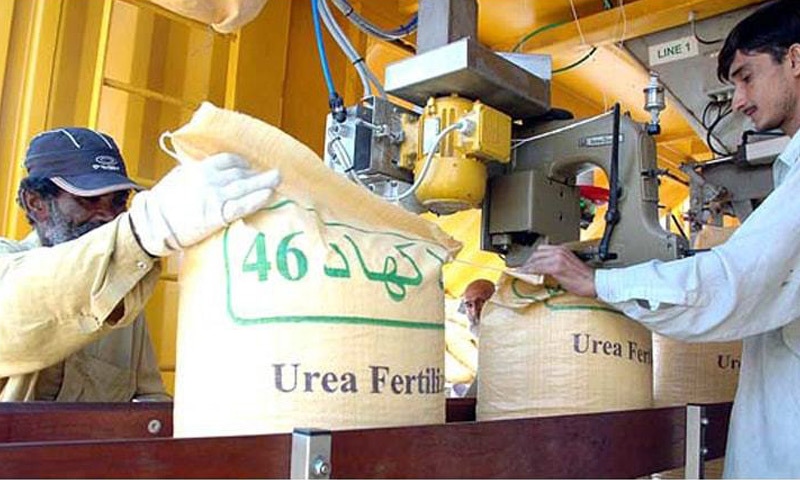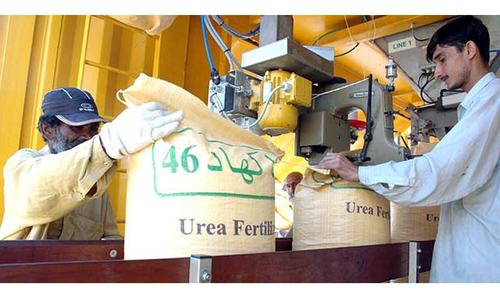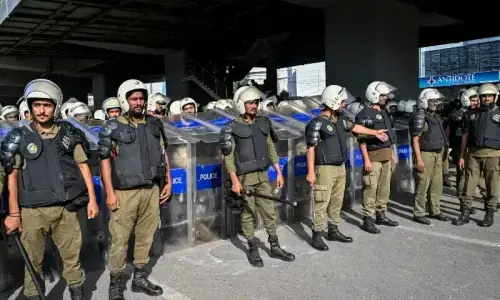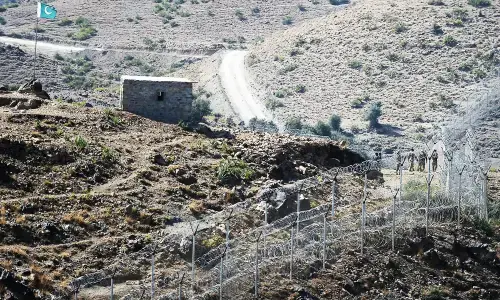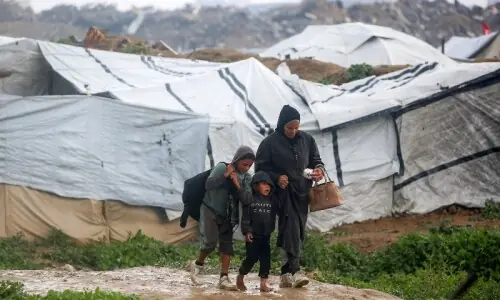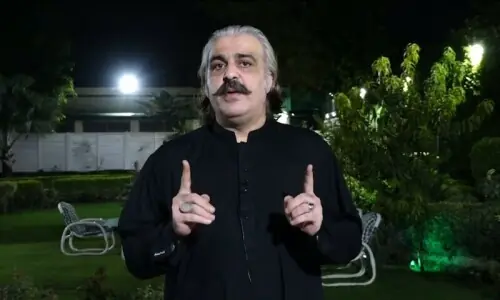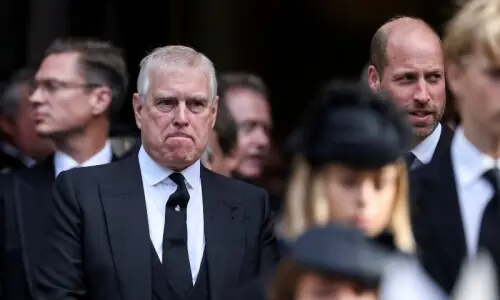ISLAMABAD: Faced with overabundance crisis, the government on Thursday decided to pump out its urea fertiliser stocks with a 27 per cent price cut to recoup some of the agricultural loss of the last fiscal year.
The decision was taken at a meeting of the Economic Coordination Committee (ECC) of the Cabinet presided over by Finance Minister Ishaq Dar. The committee also approved introduction of better quality petrol in the market by October.
The ECC allowed the sale of imported fertiliser currently available with National Fertiliser Marketing Limited (NFML) at Rs1,310 per 50-kilogram bag instead of its existing average price of Rs1,786. This will cost the government an amount of Rs2.6 billion.
ECC also exempts Salter scales from duty, approves introduction of better quality petrol from October
The meeting was informed that the Trading Corporation of Pakistan (TCP) imported 344,000 tonnes of urea during the last fiscal year. However, only 67,000 tonnes could be offloaded. The NFML was incurring a maintenance cost of Rs3.5 million per month, or Rs21 per bag.
Federal Minister for National Food Security and Research Sikandar Hayat Bosan proposed that farmers should be given an incentive to purchase NFML’s surplus urea to minimise carrying cost. Participants questioned the rationale behind importing such huge quantities in the first place and wanted an investigation.
It was explained that higher imports were based on previous year’s import of 150,000 tonnes by the public sector but the main cotton crop faced a 29pc loss because of crop diversions, higher fertiliser prices and other factors and farmers did not utilise the expected fertiliser quantities.
It was also explained that the NFML used to maintain a 200,000 tonnes of buffer stock to play with domestic urea prices, but the private sector also imported much larger quantities (about 170,000 tonnes) because of declining international prices.
This created a glut and there was no more reason for a buffer stock given the fact the stocks already available in the market were enough coupled with domestic produce to meet crop requirements for two to three years.
Therefore, a cost analysis exercise was carried out which indicated the carrying cost would be greater than selling the commodity with a cut of Rs476 per bag. It was also warned that carrying on with the stocks would cost about Rs5.6bn because the government would have to provide subsidy even next year.
It was argued that it would be better to offload some stocks with Rs2.6bn loss and encourage farmers to utilise higher fertiliser crops to recoup 29pc agricultural loss of last year in the next season and support agriculture sector and increase exports. It was agreed that lower cost of production to farmers could help achieve higher crop output.
PERTOL SWITCH: The ECC also approved introduction of 92 research octane number (RON92) premium motor gasoline (petrol) in the country with effect from next cycle of Pakistan State Oil (PSO) import tender.
At present, Pakistan is using RON87 premium which is almost abandoned in most of the world. The new arrangement will be effective from the next cycle of PSO tender enabling RON92 sale in possibly October this year.
The new fuel will be cleaner and efficient with lower carbon emissions. The Oil and Gas Regulatory (Ogra) will monitor the price as was the case in RON87 petrol.
Informed sources said the marketing of better quality petrol would involve an estimated price increase of Rs2.75 per litre, but part of this would be covered through better mileage.
The petroleum ministry claimed the existing RON87 petrol was not easily available in the international market and Pakistan had to pay higher cost to enable traders to meet its specification for a lower grade product. “It will accrue benefits on account of supply sustainability, improved customer choice and efficient engine operation. It may be noted that current automobiles are designed at RON92 or higher grade,” the ministry said.
The annual consumer demand for petrol at present is about five million tonnes, of which about 70pc (3.5m tonnes) is imported and the remaining 30pc (1.5m tonnes) is met through local refinery production. The consumption has grown around 20pc in the last five years.
“The price differential between RON87 and RON92 petrol is projected to be around Rs2.74 per litre” based on last one year data at the rate of 55 paise per RON per litre, the ministry said.
“Keeping in view the lower prices in the international market, it is the optimal time for switching over from current RON87 to 92, which is marketed in most of the countries in the world at present,” the petroleum ministry said.
Domestic refineries are not capable of producing RON92 petrol because of their old technologies requiring substantial investments for upgrade. The marketing companies, refineries and the government have, however, agreed to introduce RON92 as main grade fuel.
For this to deliver, oil marketing companies (OMCs) will be allowed to import and market minimum RON92 petrol under the existing regulated regime while import of petrol below RON92 will be banned. The OMCs will get RON87/90 petrol from refineries as is the practice now and then commingle imported and locally produce grade to improve the specification to retail level at around RON91.
Pricing formula for imported RON92 petrol will be based on five-day average Mean of Platts Singapore (MOPS) quotations plus tender and freight premiums/incidental charges on an actual basis. The pricing of this product would be on the basis of PSO’s actual landed cost while other OMC or refineries would also follow it as is the current practice.
The pricing mechanism for local refineries will be based on PSO’s actual landed import price of RON92 minus a RON penalty factor to derive the price for RON90/87 petrol. The local refineries that produce RON92 either directly or through blending will get its full price on actual PSO landed import price.
Similarly, the taxes and levies and other cost elements applicable on the existing RON87 petrol will apply on RON92 and RON95 petrol. The government would make necessary provisions for incorporation of RON92, 95 and 97 petrol in the Petroleum Products (Petroleum Levy) Ordinance of 1961 and respective rules will be made accordingly.
The ministry said the local refineries would now produce RON90 shortly except for Attock Refinery, which would be allowed to continue producing the current RON87 petrol till a solution was found that reduces or eliminates their surplus naphtha production.
OTHER DECISIONS: The ECC also approved a proposal of the Ministry of National Health Services, Regulations and Coordination to exempt from customs duty and sales tax the import of Salter scales for Lady Health Workers Programme to avoid stunting challenge (underweight) in children.
The United Nations Children’s Emergency Fund (Unicef) has provided $1.3m available under the Global Alliance for Vaccines and Immunisation Health Strengthening System Fund which will be utilised to purchase around 38,000 scales and other equipment to be provided across the country to help children affected by stunting. Stunting can be addressed with growth monitoring and nutritional advice during the first three years of a child.
The meeting also granted exemption from tax and duties for import of machinery and equipment and construction material to the National Highway Authority for infrastructure projects under the China-Pakistan Economic Corridor.
Published in Dawn, August 19th, 2016

